(As the title says, this is an interview with Michiel Dekker and Robin Kok of The Monolith Deathcult. I feel sure they are in this photo somewhere. I also feel sure you will thoroughly enjoy this interview. Speaking for myself, I laughed, I cried, I experienced the whole range of human emotions. And that was just while I was writing the questions. If somehow you don’t know about TMDC’s new album Tetragrammaton, read Andy Synn’s review here. The excellent photos accompanying the interview were taken by Raymond Groenink.)
Thanks for taking these questions. Not that you have anything better to do, but I’m trying to be polite. Is it working?
Robin: About as polite as an Anal Cunt song.
I’ll count that as a “Yes”. I was told you have a new album that’s now out. Is this true? I’d just like a little warning so I can make sure my bomb shelter is well-stocked and ready for occupancy.
Robin: I would like to officially state that whoever is spreading this misinformation, is spreading malicious truth.
Very well then. I understand the new album is named Tetragrammaton. I did some research, and it seems that “tetragrammaton” is the ancient Greek word that refers to the Hebrew theonym יהוה (transliterated to the Latin letters YHWH), which is considered in Judaism to be a proper name of the God of Israel used in the Hebrew Bible. Some people might think you’re putting on airs. Why did you pick this as the name of the album?
Robin: Mainly so we could wallow in our own grandiose pseudo-intellectual wank and get interview questions that are marginally more interesting than asinine tripe such as “could you please introduce the band to us” or “tell us about your new album” or “Thanks for taking these questions. Not that you have anything better to do, but I’m trying to be polite. Is it working?”. We picked this title for several reasons. 1) To keep in line with Trivmvirate (III = our third album), we needed a word that meant something to do with ‘four’ without actually being ‘four’. Tetra- means ‘four’ of course, so that’s that covered. The four letters could mean YHWH, but what they don’t tell you at bible study is that it really means TMDC. So no, we’re not putting on airs: we’re in full-on self-congratulatory mode!
Michiel: We also chose tetrAgrAmmAton as album title because of the triple A in it, to emphasize our major role in the music scene as we know it and because AAA stands for “PRIME” which is of course a reference to the narrator on this album.
Thank you for clearing that up. It seems that most of the songs on Tetragrammaton refer to actual historical events, including of course the awakening of Unicron from stasis. Is there any single theme or concept behind the album that explains why these particular events were chosen as the subject matter?
Michiel: Not really, our lyrics mostly handle subjects which have our provisional interest at that time. There was a time Robin and I were very into the Saddam’s Al-Tikriti clan. We read everything we could get our hands on about it and watched all documentaries and movies (House of Saddam/The Devils Double). So we wrote the follow up of “Wrath of the Ba’ath” entitled ”Qasr Al-Nihaya”. We chose the Arabic word for The Palace of the End (Saddam’s torture prison) to keep connection with our Nile fan base. They love Arabic song titles.
Since The White Crematorium’s “Origin” I’ve written for every album a sci-fi-laden track. I was always a huge Transformer fan, so for me it was a win-win situation when they released 3 Transformer movies AND I got the ability (through bribery, dusky money transactions, and ruthless blackmailing) to get the voice of The Prime on our album. So there was “Gods Amongst Insects”. Unicron has awakened and soon this planet will be dark forever.
Okay. Since the end is rapidly coming upon us, it might be a good idea if I saved listeners some time and asked about the subjects of each song. But first, I’m curious about the songwriting process: what came first — the music, or the lyrics and song titles?
Robin: The merging of music and lyrics is late in the writing process. Lyrics, lyrical themes and musical themes get swapped, interchanged and altered all the time. Some songs change themes multiple times.
Michiel: It differs from time to time. Most songs start with a lyrical hook like,”No Peace!” or “wherever you are, death will find you”. The idea is to build a song around that theme and start mercilessly spitting out demo tracks to the rest of the band. I think there are 50/60 demos of each song with most of the time very small differences which I only hear. But sometimes whole themes have been removed and transplanted into another song. In the last weeks of song writing when the time pressure is getting very tense everything falls into place. When I listen to the album now I can’t even imagine how difficult it was to get the songs done.
 Turning to the subject matter of the songs, the first track is the one that involves the rise of Unicron, “Gods Amongst Insects”. It’s not a very friendly song, what with all that talk about “the destruction of all life, stars, and nebulae, leaving only nothingness and void.” Would you care to comment on what was intended by this song?
Turning to the subject matter of the songs, the first track is the one that involves the rise of Unicron, “Gods Amongst Insects”. It’s not a very friendly song, what with all that talk about “the destruction of all life, stars, and nebulae, leaving only nothingness and void.” Would you care to comment on what was intended by this song?
Robin: This is a philological essay on neo-deconstructivist attitudes to the state of religiously anthropomorphised invertebrates in the aftermath of the Leavisite vs. Poststructuralist struggle that has been holding our stellar zeitgeist captive for the past decades. Either that or we just really fucking hate unicorns, okay?
I knew it had to be one of those two things. But how did you get Peter Cullen to agree to the use of his voice in the Unicron samples?
Robin: We didn’t, but the concept of ‘consent’ seems to lose its ethical meaning when you’ve been waterboarding someone (say, Peter Cullen, hypothetically) for weeks and then whisk someone (say, Peter Cullen, for argument’s sake again) off to a sound booth with a lyrics sheet. Purely hypothetically speaking, of course.
Michiel: And when we threatened to extinguish his spark he agreed to do some extra narration as you can hear on HWA, SADM and ASLIMU.
He seems like an imminently reasonable person. By the way, what did you think about the Transformers movies?
Michiel: The opening scene of the first movie with Blackout transforming from a helicopter to a giant Robot was everything I hoped for since I was a kid. The most epic scene for me is when the GIs are running for their lives in the desert with the giant metal scorpion on their tails.
Rise of the Fallen was a disappointment with the stupid pyramid plot, but the appearance of Soundwave and Devestator saved the movie for me. Dark Side of the Moon was a killer movie again with Shockwave and his Drillerbot. Can’t wait for number four. It seems that Unicron is coming to earth and I hope he isn’t as gay as Galactus in Rise of the Silver Surfer. That was just a stupid filthy cloud.
I can also recommend the Transformers Prime series.
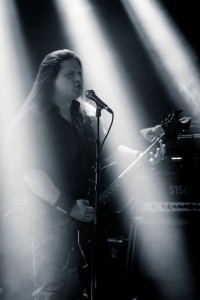 The next song on the album is “H.W.A. (Human Wave Attack)”. What’s the story behind this one?
The next song on the album is “H.W.A. (Human Wave Attack)”. What’s the story behind this one?
Michiel: “Human Wave Attack” is about the Brainwashed Iranian Pasdaran youth who cleared the minefields for the army in the Iraq-Iran War. The human wave attack is a military tactic relying on sheer and overwhelming numbers of attackers to subdue another force. In some ways, the attack is very brutal, since members of the human wave attack serve only to add to the numbers of the attack. Heavy casualties in the wave are usually the result of this form of tactic, and the military force perpetuating the attack may be forced to accept these losses in an effort to achieve victory. Sun Tzu wrote about it in The Art of War.
“Drugs, Thugs & Machetes” comes next. This one is also focused on historical events. Could you describe the historical context, and comment on the reason for including the sample of Martin Luther King, Jr.?
Michiel: “Drugs, Thugs & Machetes” is about the ruthless butchering in Rwanda in the nineties. The Clinton government and UN refused to call it genocide, because their statutes tell them to act when genocide happens. Estimated death toll 800.000…
I had the feeling the song needed something extra. Robin (or I) had the idea to add some radical Black Panther propaganda, but we didn’t get our hands on something useful so I thought it would be a massive contrast with the merciless butchering to use a peaceful speech of MLK, full of hope, love and respect. To enlighten the song a little bit I stole the terminology “Pure Blood Traitor” from the Harry Potter books. AND it has the Wilhelm Scream on it!
Oh hell, I missed that! One more reason to listen again. Moving on, I know what “Todesnacht von Stamheim” is about, since I did some research before writing about the lyric video when it premiered (watch it HERE). But for the benefit of others, what is the subject of this song and why did TMDC choose to write about it? And what’s with the chanting of Ho-Chi Min’s name?
Robin: “Todesnacht von Stammheim” (lit. Death night in Stammheim) deals with the near-simultaneous suicides of three key members of the Red Army Faction (German: Rote Armee Fraktion (RAF), also known as the Baader-Meinhof group) on 18 October 1977. Since people responded to Kindertodeslied on Trivmvirate so well, we decided to keep milking the chugga-chugga Rammstein-styled German-themed songs. We were surprised to hear that so few people knew about the ruthless mass-murdering terrorists of the RAF and decided to do a song on them.
Michiel: The Ho-Chi Min part is inspired by a scene in the Baader-Meinhof Komplex movie where a German crowd during an anti (Vietnam) war rally burst out in “Ho-Chi Min! Ho-Chi Min!” to show their support to the Vietcong. It is a great sing-along at live shows.
“S.A.D.M. (Svpreme Avantgarde Death Metal)” seems like an outlier, more of a self-referential piece than something based in history. What’s the story behind this one?
Michiel: This song is for own interpretation of the listener. S.A.D.M. is like a mirror in an empty vessel: people see in it how they are themselves and what they want to see.
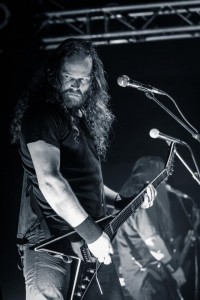 I’d much rather be spoon-fed the meaning like a spoiled baby, but have it your way. That brings us to the penultimate track, “Qasr Al-Nihaya”. Could you explain what this one is about?
I’d much rather be spoon-fed the meaning like a spoiled baby, but have it your way. That brings us to the penultimate track, “Qasr Al-Nihaya”. Could you explain what this one is about?
Robin: “Qasr Al-Nihaya” is the name of the torture prison used by the Hussain regime in Iraq. It was probably as close to Orwell’s room 101 as you could possibly get outside of Soviet Russia. The song is loosely based on Latif Yahia’s story, who was picked by Uday Hussain, Saddam’s son, to be used as his fidai, his body double / bullet catcher / personal slave.
Michiel: The song is very dark and industrial at the beginning. Heavily inspired by Meshuggah and Demanufacture. The thrash theme in the song is a riff I wrote more than 10 years ago for my band then, Deadhead. It cost me 3 albums to add this theme in a track but finally! And there is a cool reference to “A Day In The Life” from Sgt. Pepper’s Lonely Hearts Club Band. Not that we like the Beatles (well, Robin does) but Lord Petrus Steele did. We piled up idea after idea so that is why our music is so layered. It costs 5 year to write a TMDC album.
That brings us to the closer, “Aslimu!! – All Slain Those Who Bring Down Our Highly Respected Symbols to the Lower Status of the Barren Earth”. There may be other metal songs with longer titles, but I can’t think of any at the moment.
Michiel: “Papyrus Containing the Spell To Preserve Its Possessor Against Attacks From He Who Is In the Water” – Nile. “Several Species Of Small Furry Animals Gathered Together In A Cave Grooving With A Pict” – Pink Floyd. “El Phantasmo And The Chicken Run Blast-o-Rama” – White Zombie.
Okay, I admit defeat. Would you please explain to our readers the story behind this track?
Michiel: We recorded this song to get a record deal with Season of Mist. Morbid Angel had just put out Illud Divinum Insanus and Season of Mist was promoting this album as a groundbreaking mixture between deathmetal and techno/dance/etc. I got irritated and shot Michael Berberian from SOM an e-mail telling him we’d been doing that (only infinitely better) than Morbid Angel since 2008, and Michael’s reply was something in the vein of to put your money where your mouth is. So we slapped together a promo track, which was “Aslimu”, and, characteristic of the French, he surrendered immediately to the overpowering awesomeness of the Deathcult and we were signed.
“Aslimu!!! – All slain those who brought down our highly respected symbols to the lower status of the barren earth” is the oldest song on the album and is about the rise of the Muslim Brotherhood under Sayyid Qubt. It is based on Lawrence Wright’s Looming Towers book. It tells the story of the Muslim brotherhood and the birth and early days of Al Qaida. The tag line ”Wherever you are, death will find you. Even in your looming towers” is a Quran verse and was very useful for a lyrical hook.
 You guys have a habit of poking fun at yourselves and your capabilities as musicians, which is certainly different from the typically grim and serious personas of other death metal bands. I mean, you don’t usually see a band referring to their own music as “a mass of stupid troglodyte filth.” Yet the Tetragrammaton songs are also mostly about very serious subjects, and the music itself is often very dark, vicious, and obliterating. How do you reconcile these seeming contradictions?
You guys have a habit of poking fun at yourselves and your capabilities as musicians, which is certainly different from the typically grim and serious personas of other death metal bands. I mean, you don’t usually see a band referring to their own music as “a mass of stupid troglodyte filth.” Yet the Tetragrammaton songs are also mostly about very serious subjects, and the music itself is often very dark, vicious, and obliterating. How do you reconcile these seeming contradictions?
Robin: Seemingly contradictory, but you must master the soft the better to appreciate the hard. Metal is all about doing things that are ‘not done’, until someone decides to step out of the self-referential ego-image jail that bands have carefully crafted for themselves. And it’s better to call your own music a ‘mass of stupid troglodyte filth’ before a reviewer does it. I wanted to describe my vocals on this album as “pithecanthropoid ululations”, but the press officials at Season of Mist advised us to avoid polysyllabic words so we don’t alienate our fans, or some such marketing rot. It had better make us some cash.
I hope it does, because I would like to borrow some, interest free. With regard to the music itself, did the band have specific objectives for Tetragrammaton, something specific you wanted to achieve as a next step beyond what you did on the previous albums (and Trivmvirate in particular)?
Robin: After Trivmvirate, the bar was set high. I mean ridiculously high. We’ve had a number of beyond-fanboy reviews from zines around the globe, like 9/10 or 10/10 marks for Trivmvirate. In the immortal words of Nigel Tufnel, “where do you go from there?”. The path to inevitable disappointment was laid out as soon as Trivmvirate hit the shelves – it would be very, very difficult to push the envelope beyond what we’ve achieved with our previous pinnacle of human civilisation (i.e., Trivmvirate). That’s why we’ve been spending the past few years in a controlled contextual demolition campaign. In 5 years, we’ve slowly been poisoning global awareness with little cultural tumours so we wouldn’t have to look pretty – we’d just have to make sure the rest of the world would look ugly. Justin Bieber? Nicky Minaj? Ke$ha? Jersey Shore? That’s all our doing. Each and every one of those was a plant, wheeze to lower the global bar for our new album. Also, for this album – it would be nice to actually earn some money. I have a habit to support, you know.
Michiel: For Tetragrammaton I wanted to explore the more industrial side of TMDC. It might sound weird to your readers but the albums I listened to when I was out of inspiration were Dusk and Her Embrace from Cradle of Filth and White Zombie’s Astro-Creep: 2000. Two totally different bands, which is a clear example of the broad range of musical interests we have in TMDC. TRIVMVIRATE was sort of an accident with a happy ending, On Tetragrammaton I had a better idea what I wanted to achieve.
Do you have a favorite song on the new album, and if so, which one and why?
Robin: I particularly like the bit of silence at the end. Other than that, no real favourites. Maybe a few tracks that evoke a slightly less disgusted arc of vomit when I hear them, but other than that I like all tracks equally. When the CD is kept in the cellophane, that is. Some things are best kept unspoiled after they’ve been created. OK, I guess “Drugs, Thugs and Machetes” is the least revolting for me.
Michiel: 3 months before we started recording I was absolutely sure that “Qasr Al-Nihaya” wasn’t good enough for the album. It was Ivo who begged me not to delete the track. Now it is one of my favourites. I love all the songs because of their layers and length. Our songs are not built on one particular riff. Because if the riff sucks the whole song does AND we are fully aware of our capabilities as musicians, so we played it safe and put 10000 different riffs in each song.
 Seems legit. But how then do you explain the shitty advance review from the Kazakhstan Death Metal Observer and Livestock Market Journal?
Seems legit. But how then do you explain the shitty advance review from the Kazakhstan Death Metal Observer and Livestock Market Journal?
Robin: That must be a fluke. I understand that due to the strict five-year plan economy in Kazakhstan, two formerly successful magazines (Kazakhstan Death Metal Observer and Kazakhstan Livestock Market Journal) have had to join forces and compete for printing paper. Since they also share offices, reviews for sheep events and death metal sometimes get mixed up and I’m afraid our CD was reviewed by someone who feels more at home in the world of sheep herding than extreme metal. I wonder what the Death Metal reviewer made of the 36-hour Blu-ray box-set highlights of the 1996 Dagestan Sheep Herding Championships. 9/10, I expect. I hear the footage is sublimely immaculate in 1080i full HD and 7.1 Dolby Surround.
Michiel: Be wise and avoid all countries which names end with –stan.
It’s not my business of course, but in the future I suggest you not request reviews from publications that can’t tell the difference between TMDC and a herd of wooly ruminants.
One of the things that in my mind makes Tetragrammaton so distinctive (other than the sonic booms) is the way in which it successfully integrates so many different musical elements — brutal, decimating death metal; industrial electronics; symphonic enhancements; and a lot of melodic variation (including Middle Eastern melodies). Do different members of the band contribute each of these different musical ideas, perhaps based on their own individual musical interests?
Robin: I don’t think we’ve every analysed it like that, but I think that’s how the songs evolve, yes. Someone might have an idea [1], and after communicating this idea it may be either A) viciously and savagely laughed at and used to shame that band member for a long time, or B) the idea might get pursued and tried on for size. In theory every idea is viable – we have an ‘everything goes’ approach. If it works, it works. If it doesn’t, we put it on CD anyway and try to milk it commercially for all it’s worth. To prove that everything goes, we’ve been contemplating doing a cover version of The Army of Lovers’ songs ‘Israelism’ and ‘Crucified’ for years.
Michiel: The idea of covering The Army of Lovers songs is not based on provocation. I am sure that I can rebuild them in very cool and dark metal versions. Think about how Type O Negative did Black Sabbath or Laibach’s “Jesus Christ Superstar”.
[1] Read: Michiel has a brilliant idea.
I feel the need to put those songs here, much as it pains me to do so. They are indeed badly in need of rebuilding.
What have you got lined up so far in the way of festival appearances and tours in the months ahead?
Michiel: We will play @ the Graspop Metal Meeting and The Eindhoven Metal Meeting. We hope to come over to the USA, so if people want to see us there they can contact our booking agency @ http://tmr-music-promotions.com/
I will do my best to get people to flood that site with requests. [Attention people: FLOOD THAT SITE WITH REQUESTS!]
Possibly it may be too soon to begin talking about the next TMDC album, but are there any plans to use the Hadron supercollider next time?
Robin: I can’t see why not, provided the LHC uses audio tubes instead of transistors. Does it?
I have no fucken idea. I was just trying to sound brainy. Yet another failure, obviously. So can you tell me a heretofore undisclosed secret about TMDC and/or the album so we can claim that NCS got something exclusive for this interview? I want to do all I can to get people to read a TMDC interview, but trust me, it’s not going to be easy.
Michiel: TMDC does not stand for The Monolith Deathcult but for The Michiel Dekker Club.
I guess I ought to wrap this up. Once again, though you probably had nothing better to do, thanks for letting us pester you with these questions. We wish you great success with Tetragrammaton.
[Tetragrammaton can be streamed in full HERE and purchased at this location or this one.]

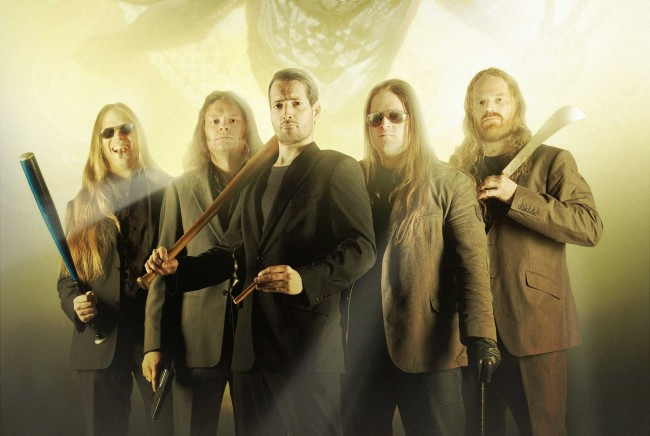
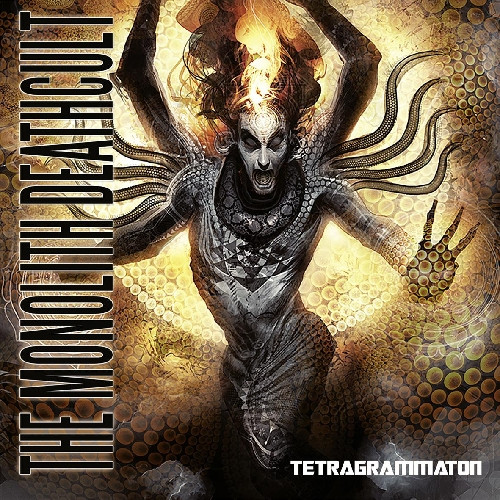
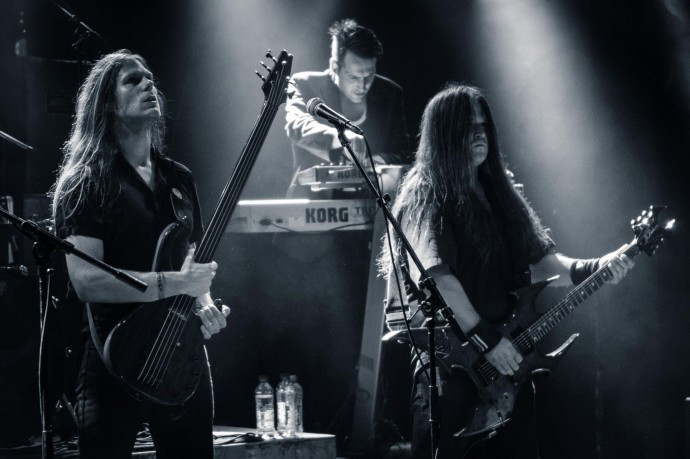
This is an interview full of “win” as the kids would say.
Although I think this is my favourite part:
“We recorded this song to get a record deal with Season of Mist. Morbid Angel had just put out Illud Divinum Insanus and Season of Mist was promoting this album as a groundbreaking mixture between deathmetal and techno/dance/etc. I got irritated and shot Michael Berberian from SOM an e-mail telling him we’d been doing that (only infinitely better) than Morbid Angel since 2008, and Michael’s reply was something in the vein of to put your money where your mouth is. So we slapped together a promo track, which was “Aslimu”, and, characteristic of the French, he surrendered immediately to the overpowering awesomeness of the Deathcult and we were signed.”
Well, as a citizen of the considerably diminished and largely moribund British Empire, you would like that part the best.
Actually it was less about the French part and more because I said exactly the same thing about TMDC pre-empting Morbid Angel in a column a while back…
I forgot about that, but so you did:
https://www.nocleansinging.com/2011/11/22/the-king-is-dead-long-live-the-king/
I’m like Nostradamus, I am.
So much win in this interview. Going to buy the bew record (shame on me for not doing so)
a great interview, and a great album
Thank you!